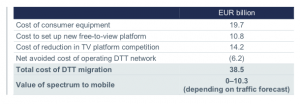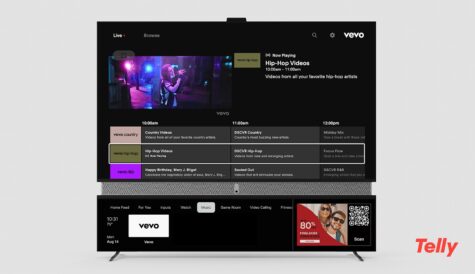Value of UHF for DTT “outweighs mobile by four to one”
Digital-terrestrial broadcasting would provide the most valuable use of UHF spectrum for the next 15 years, according to a study by consultancy Aetha for Abertis Telecom, Arqiva, the BBC, Broadcast Networks Europe (BNE), the EBU and TDF.
The report said that the value of the 460-862MHz or UHF band is greater for DTT than mobile operators by a factor of four to one, even if the most aggressive mobile data forecasts for increased mobile traffic are accepted, and that there is no case for the co-primary allocation of the band at the next World Radiocommunications Conference (WRC-15).
According to the study, the cost of clearing DTT from the UHF spectrum would total €38.5 billion, significantly outweighing the potential value of using the spectrum for mobile applications under the most optimistic assessment of mobile demand of €10.3 billion. “There is clearly no economic case for switching off existing DTT networks across Europe on the grounds of spectral efficiency,” the report said.
The report also concluded that “the introduction of a co-primary allocation to mobile at WRC-15 would have considerable negative impacts on DTT” and posed a threat to the future of terrestrial broadcasting.
“Given the history of DTT spectrum being awarded co-primary status for mobile and that then leading to the spectrum being cleared for mobile, granting a co-primary allocation to mobile in the 470–694MHz band would undermine investor confidence in the future of the platform. This would lead to the DTT platform falling behind other television platforms and even unnecessarily risk its viability, with little benefit to be derived,” it said.
The report considered two scenarios – the preservation of the entire UHF band for DTT and the cessation of DTT transmissions, with all UHF spectrum being made available for mobile services. This was justified on the grounds that the authors did not “detect that there is any appetite for further ‘salami slicing’ of the UHF band, given the amount of time and effort that is required to enable this to occur in terms of the international coordination process as well as the cost of migrating DTT transmitter sites onto new frequencies, which would be required on a widespread basis across the EU”.
In addition, it said that if DTT was moved to the 600MHz spectrum, the freeing up of 32MHZ of spectrum for a new mobile sub-band thanks to the removal of one DTT multiplex would not justify the work required to achieve it.
“Mobile traffic forecasts – even the most optimistic – can no longer justify claims to more UHF spectrum for mobile networks. We welcome the report and urge European administrations to reach the same conclusion, with a view to ensuring Europeans continue to have universal and free-to-air access to a broad range of TV and radio programmes and content, as well as other over-the-air services,” said Simon Fell, EBU technical director.




